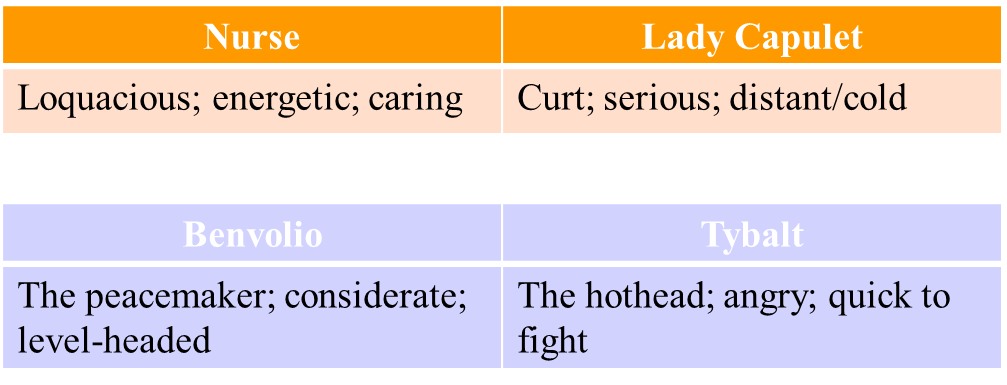What is a summary?
GIST - brief restatement of the main ideas or key points of a text, story, or event.
What is a metaphor?
A literary device that compares two things without “like” or “as”
What is a pronoun?
Words used in place of nouns.
What is subject-verb agreement?
When the verb matches the number of subjects.
Who are the two feuding families in the play?
Montague & Capulets
Explain the difference between a summary and an analysis.
A summary is a brief overview of the main ideas or events in a text.
An analysis goes deeper into the text. It examines how the author uses literary devices, themes, and character development to convey meaning
What are the three types of irony?
Verbal, situational, ironic
Give an example of a personal pronoun that is unacceptable in academic writing.
May include: I, Me, My; You, Yours
Identify the error: "The group of students are going on a trip."
"The group of students is going on a trip."
What is dramatic irony?
When the reader knows something the characters do not.
Summarize Romeo & Juliet thus far.
Mentor Discretion
Define both direct and indirect characterization.
Direct characterization explicitly tells readers details about a character.
Indirect characterization implicitly reveals details about a character through actions, dialogue, thoughts, and interactions with other characters, rather than being explicitly stated by the author.
Convert the noun into possessive form: “That’s my dog bone.”
That’s my dog’s bone.
What is the correct verb form in this sentence: "Neither the teacher nor the student _ (is/are) ready."
Is
Name two sets of foils from Act 1 of the play and explain how they are characterized.

How many pieces of relevant evidence do you need to support analysis in a Part 3 Essay?
Two
What is the following an example of?
‘O, loving hate! O, brawling hate!
Cold fire, serious vanity…’
Oxymoron
Explain the difference between. Plural nouns and possessive nouns.
Plural nouns denote multiple people/places/things
Possessive nouns show ownership.
A huge pack of wolves ___ (is/are) right beside us.
Is
Elizabethans believed in Divine Order. What does that mean?
 They believed people’s lives were determined by fate or a higher power.
They believed people’s lives were determined by fate or a higher power.
What two things do you need to analyze in a Part 3 essay?
1. Central idea
2. Literary device 
In the phrase "Peter Piper picked a peck of pickled peppers," this device is prominently featured. What is it?
Alliteration
Complete the sentence.
I’m going to the movies with ___.
[she and Jacob] OR [her and Jacob]
I’m going to the movies with [her and Jacob].
One of the kids in the class ___ (read/reads) the book out loud while their classmates ______ (follow/follows) along
One of the kids in the class reads the book out loud while their classmates follow along.
Provide an example of dramatic irony from Act 1.
Various acceptable responses.